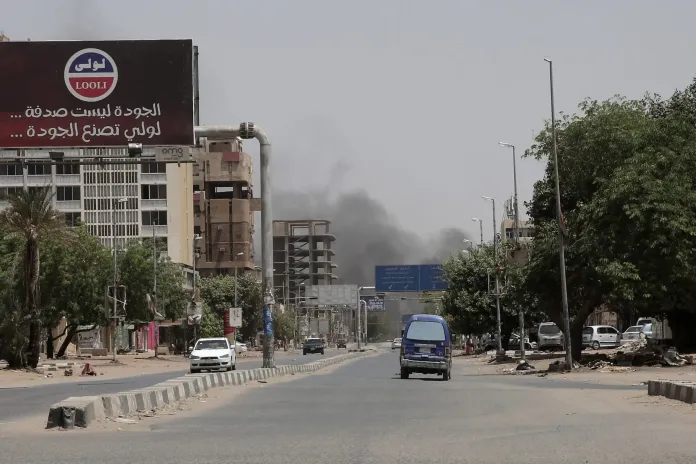KHARTOUM, Sudan (Kaab TV)– For the second day, the Sudanese military and the powerful Rapid Support Forces (RSF) paramilitary group are engaged in violent clashes, signaling an unwillingness to halt hostilities even amidst growing diplomatic pressure to cease fire.
These ongoing battles have resulted in mounting civilian casualties and disrupted the country’s fragile democratic transition.
According to the Sudan Doctors’ Syndicate, at least 56 civilians have been killed in the conflict, with the belief that dozens more casualties have occurred among the rival forces.
Nearly 600 people have been injured, including both civilians and fighters.
The clashes come after months of heightened tensions between the military and the RSF, which have delayed a deal with political parties to return the country to its short-lived democratic transition following an October 2021 military coup.
Heavy fighting continued early Sunday morning in the capital of Khartoum and the neighboring city of Omdurman.
Prominent human rights advocate Tahani Abass reported fierce battles around the military headquarters, Khartoum International Airport, and state television headquarters.
“It’s an all-out war in residential areas,” Abbas said, describing the situation as families huddled in their homes for safety.
Both the military and the RSF claim to be in control of strategic locations within Khartoum and elsewhere in Sudan, although their assertions could not be independently verified.
With neither side willing to negotiate, tensions continue to escalate.
The military, led by Gen. Abdel-Fattah Burhan, has called for dismantling the “rebellious militia” RSF. At the same time, the RSF leader, Gen. Mohammed Hamdan Dagalo, demanded Burhan’s surrender.
As the conflict intensifies, international diplomatic pressure mounts.
Top diplomats, including U.S. Secretary of State Antony Blinken, the U.N. secretary-general, the E.U. foreign policy chief, the head of the Arab League, and the head of the African Union Commission, have all urged the warring parties to cease fighting.
Regional Arab states with stakes in Sudan, such as Qatar, Egypt, Saudi Arabia, and the United Arab Emirates, have also called for a cease-fire and a return to negotiations.
In a statement early Sunday, Secretary Blinken emphasized the importance of ending hostilities without preconditions following consultations with the foreign ministers of Saudi Arabia and the United Arab Emirates.
The recent hostilities stem from disagreements over integrating the RSF, led by Dagalo, into the armed forces and the overseeing authority of the process.
The merger is crucial to Sudan’s unsigned transition agreement with political groups.
Pro-democracy activists have accused Burhan and Dagalo of abuses against protesters over the past four years, including a deadly incident in Khartoum in June 2019 that resulted in the deaths of over 120 protesters.
The RSF has also faced allegations of atrocities linked to the Darfur conflict, further complicating the ongoing crisis.


